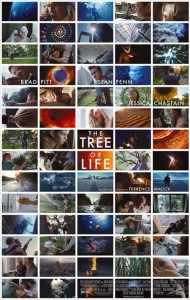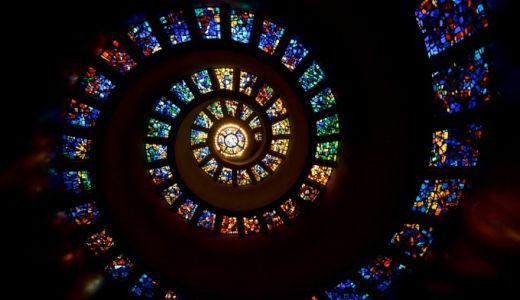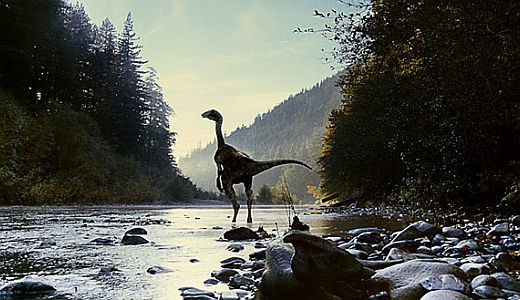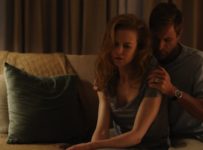Malick’s most challenging work to date may defy conventional description. Stunning and provocative, it is sure to divide audiences in its unabashedly pretentious examination of the meaning of existence. Beautiful and haunting, this is what cinema was created for.
 Few filmmakers can make claim to the word ‘enigmatic’ as much as Terrence Malick. After graduating from script-writing to directing his own films with the sublime Badlands, and winning Best Director at Cannes for 1978’s Days of Heaven, the director settled into planning for Q, a film intended to trace the origins of the universe. Yet it would be 20 years before Malick would emerge again with the critically acclaimed The Thin Red Line, earning him a Golden Bear at the Berlin Film Festival and a slew of other nominations. It would be another seven years before his take on the Pocahontas story, The New World, would emerge. Returning to some of the themes developed for Q, Malick reappears with one of his most ambitious and breathtaking films to date, earning him the Palme d’Or at the 2011 Cannes Film Festival.
Few filmmakers can make claim to the word ‘enigmatic’ as much as Terrence Malick. After graduating from script-writing to directing his own films with the sublime Badlands, and winning Best Director at Cannes for 1978’s Days of Heaven, the director settled into planning for Q, a film intended to trace the origins of the universe. Yet it would be 20 years before Malick would emerge again with the critically acclaimed The Thin Red Line, earning him a Golden Bear at the Berlin Film Festival and a slew of other nominations. It would be another seven years before his take on the Pocahontas story, The New World, would emerge. Returning to some of the themes developed for Q, Malick reappears with one of his most ambitious and breathtaking films to date, earning him the Palme d’Or at the 2011 Cannes Film Festival.
The Tree of Life juxtaposes three concurrent narratives. A successful but emotionally isolated architect (Sean Penn, Fair Game) recalls his childhood in Waco, Texas. In the 1950, a suburban family, lead by the overbearing patriarch Mr. O’Brien, a young Jack (Hunter McCracken), one of three brothers, is influenced by his father and his mother (Jessica Chastain, Take Shelter) as he begins his own evolution. Running parallel to this are the origins of the universe and the first evolutionary steps of life on Earth.
For a director that infamously took two decades off between his second and third features, the dreamlike Days of Heaven and the war polemic The Thin Red Line, ambitious would hardly seem like an apt description for Terrence Malick. Yet how else would one describe a piece of art that seeks to unravel the very mysteries of existence? The narrative elements of The Tree of Life come from the 1950s O’Brien family sequences, with a powerful and often frightening turn from Pitt and the opposite emotive qualities coming from rising star Jessica Chastain. Yet to think of The Tree of Life as a period drama would be tantamount to calling Stanley Kubrick’s 2001: A Space Odyssey, to which there are some parallels, “just a science-fiction film”. Indeed, it is difficult to initially get a handle on Malick’s latest piece, as there is very little to use as a point of reference in the discussion of it. Malick has not so much recreated the Big Bang and the first sparks of life in the universe as actually filmed them with a magical lens that only he possesses. The lengthy interplays of light and sound that bookend the film do not act as separate pieces as they seamlessly integrate themselves into the fragmented narrative, just as the wondrous has become the everyday in our modern setting.
Malick’s film speaks to the tensions arising between Creationism and evolution, with Sean Penn’s character contemplating all of these notions from the almost clinically-shot contemporary setting, as if the understanding of these concepts will make the pain of loss and the absence of life easier to bear. Malick’s first take on the 21st century is a cold one, bringing the much-compared Kubrick connection even closer, the clean and simple lines indicative of a physical and emotional distance that modern humans now have with the world, and in stark contrast to the chaotic and busy origins of life. With a broad soundscape replacing dialogue for much of the picture, especially during the non-narrative musings on the nature of life, Malick’s transfixing visuals tantalise and mesmerise, allowing the viewer to sit slack-jawed in awe that life could exist at all in the vastness of creation. While The Tree of Life seemingly begins with a death, it is ultimately a celebration of life and a reminder of its intrinsic beauty.
Malick’s most challenging work to date may defy conventional description. Stunning and provoking, it is sure to divide audiences in its unabashedly pretentious examination of the meaning of existence. Beautiful and haunting, The Tree of Life is what cinema was created for.
The Tree of Life is released in Australia on June 30, 2011 from Icon.





